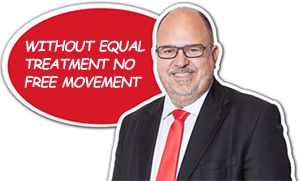Swedish wages and working conditions must apply in Sweden. This is not the case today. To change this, the EU itself must change, both in terms of legislation and treaties. Consequently, the Swedish Trade Union Confederation (LO) is demanding that a social progress protocol should be incorporated in the EU treaties, establishing that fundamental trade union rights and freedoms are not subsidiary to the economic freedoms on the EU internal market. And in the event of a conflict, fundamental human and trade union rights shall have priority.
There is a consensus today that the EU is facing major challenges. There are several challenges: the euro crisis, the refugee situation and the decision by the United Kingdom to leave the EU. Leading representatives are now open about the EU being in a crisis. And the future structure of the EU is now being discussed.
The European Union is important for Sweden. We need an EU that safeguards democracy and human rights in working life, both within and outside the EU. The goal of European trade union cooperation is to strengthen the position of workers in an internal market with free movement of capital, labour, goods and services. Otherwise there is a risk of an increasing imbalance between capital and labour, leading to more precarious employment contracts and downward pressure on wages.
The fact that LO is fundamentally positive towards the EU does not mean that we unreservedly accept the Union regardless of its structure. The regulation of the EU internal market influences which groups in society will gain or lose. If EU regulations facilitate, or in the worst case force, competition with wages and working conditions, the EU has no future. It will lead to the Union being perceived, with good reason, as a threat by large groups in the labour market. This creates attitudes that make it more difficult to handle common challenges, such as the large groups of people forced to flee for their lives to Europe. Ultimately, this will also undermine support for free movement within the EU.
The basic simple fact is that social acceptance of free movement requires regulated labour markets and equal treatment of workers. Otherwise, people will turn against free movement and in the worst case start pointing the finger at mothers and fathers arriving in Sweden to support their families, instead of at the irresponsible and semi-criminal companies that ruthlessly exploit these people. There can be no free movement without equal treatment!
This is also ultimately a question of democracy. LO cannot accept a situation in which judges in the European Court of Justice determine the requirements that trade union organisations can impose on foreign companies.
If we are to overcome the challenges we are facing there must be brave political representatives that are able to acknowledge the mistakes that have been made. Who acknowledge that the one-sided focus of EU cooperation on deregulation and free movement of services has created a gigantic market for companies that exploit people and compete with poor wages and working conditions. And finally, we need politicians who not only acknowledge these problems, but also propose and implement solutions, despite the difficulties. Otherwise, the problems we are facing will not go away. LO is prepared to take its part in changing the EU.
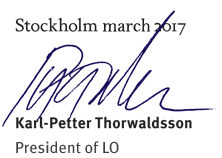


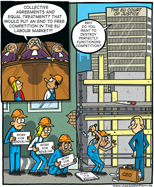
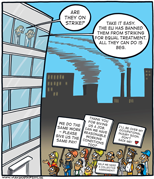

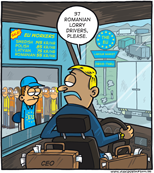
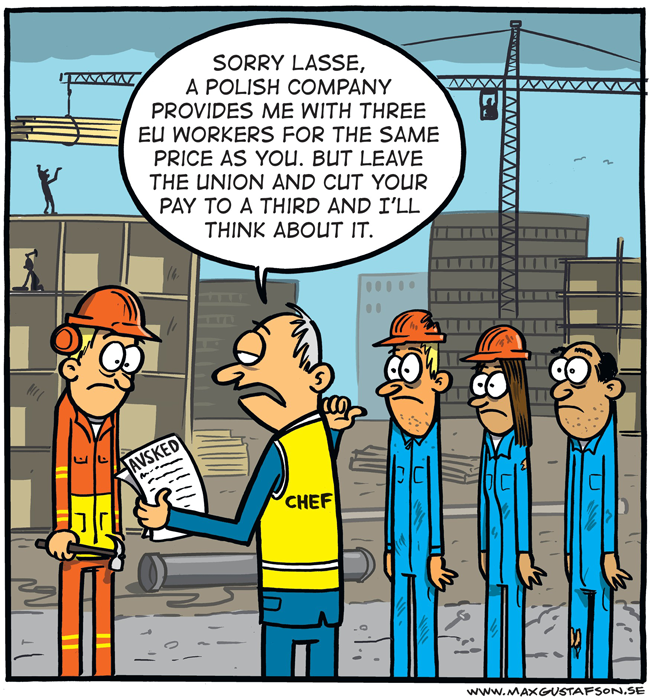
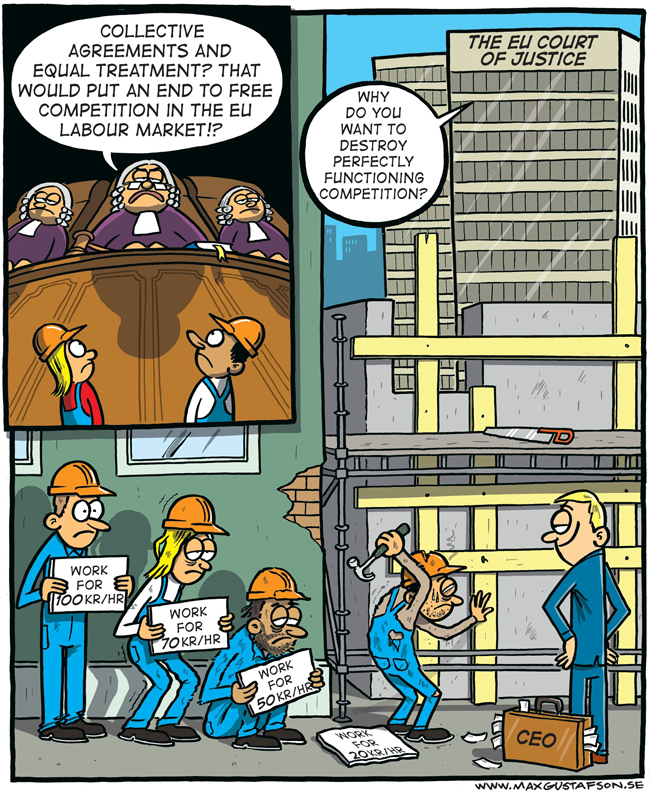
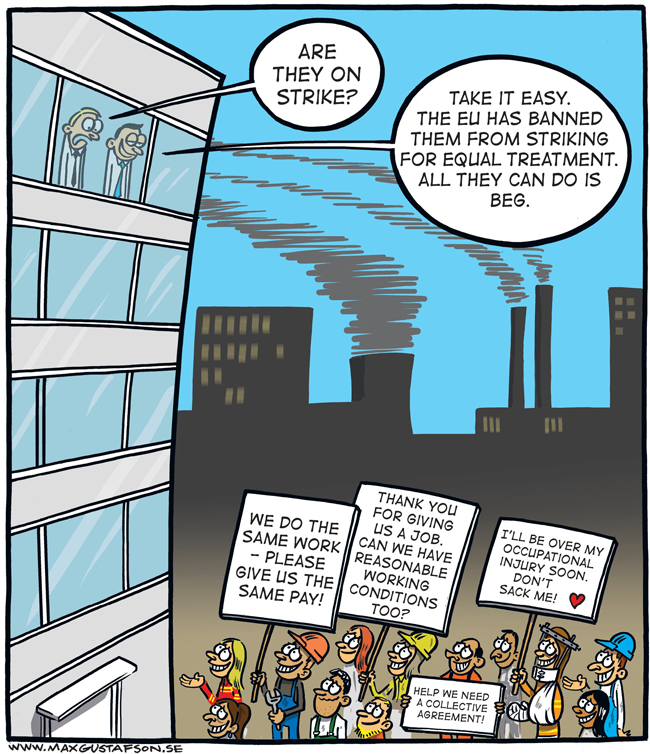
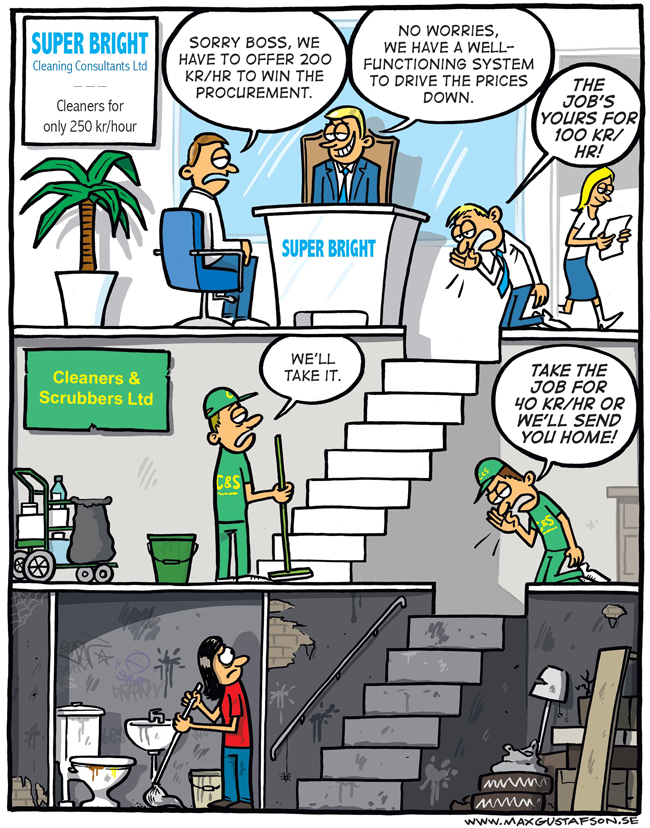
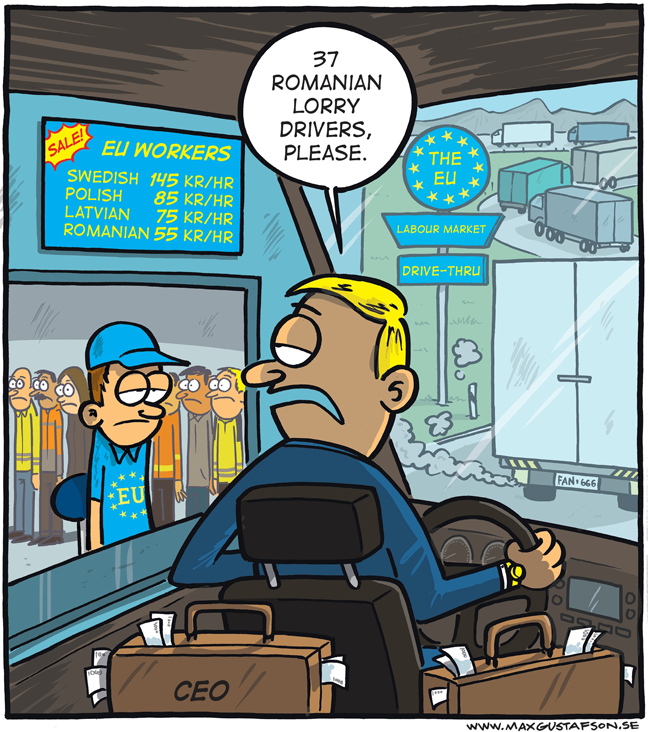
 To handle the problems that have arisen through the European Court of Justice’s ruling in the Laval case, among others, LO demands that a social progress protocol should be incoporated in the EU treaties. Fundamentally it is a matter of regulating what should be considered acceptable obstacles to the EU’s free movement of services. Our demand is that equal treatment should apply to everyone working in the Swedish labour market, even those who are posted to Sweden temporarily. Such a demand is an obstacle to companies that want to compete with poor wages and working conditions. But this is an obstacle that must be allowed if EU cooperation is to be socially acceptable.
To handle the problems that have arisen through the European Court of Justice’s ruling in the Laval case, among others, LO demands that a social progress protocol should be incoporated in the EU treaties. Fundamentally it is a matter of regulating what should be considered acceptable obstacles to the EU’s free movement of services. Our demand is that equal treatment should apply to everyone working in the Swedish labour market, even those who are posted to Sweden temporarily. Such a demand is an obstacle to companies that want to compete with poor wages and working conditions. But this is an obstacle that must be allowed if EU cooperation is to be socially acceptable. Many people believe that low-wage competition in the EU only affects the construction and transport industries. This is not true. The number of sectors affected by unfair competition is growing. In 2016 we could read about the staff agency Orange that hired out staff to municipalities and county councils in Sweden. The pay for their employees could be as low as SEK 18 per hour and no taxes or social security contributions were paid in Sweden.
Many people believe that low-wage competition in the EU only affects the construction and transport industries. This is not true. The number of sectors affected by unfair competition is growing. In 2016 we could read about the staff agency Orange that hired out staff to municipalities and county councils in Sweden. The pay for their employees could be as low as SEK 18 per hour and no taxes or social security contributions were paid in Sweden. Achieving an amendment to the EU treaties is a long-term project that LO has pursued ever since the ruling in the Laval case in 2007. The proposal for a social progress protocol was prepared by the European trade union movement after the Laval case and a number of similar legal cases in the European Court of Justice. The proposal aims to prevent competition with wages and working conditions by ensuring that fundamental trade union rights and freedoms take priority over the economic freedoms of the EU internal market.
Achieving an amendment to the EU treaties is a long-term project that LO has pursued ever since the ruling in the Laval case in 2007. The proposal for a social progress protocol was prepared by the European trade union movement after the Laval case and a number of similar legal cases in the European Court of Justice. The proposal aims to prevent competition with wages and working conditions by ensuring that fundamental trade union rights and freedoms take priority over the economic freedoms of the EU internal market. The Member States have empowered the EU to create a common market with free movement of goods, services, capital and people. At the same time, the Member States have essentially retained control over what constitutes the core of national democracy. It is still States that tax, redistribute and regulate the labour market; in addition in Sweden it is the social partners that are responsible for wage formation.
The Member States have empowered the EU to create a common market with free movement of goods, services, capital and people. At the same time, the Member States have essentially retained control over what constitutes the core of national democracy. It is still States that tax, redistribute and regulate the labour market; in addition in Sweden it is the social partners that are responsible for wage formation.